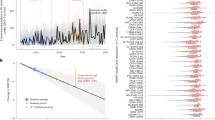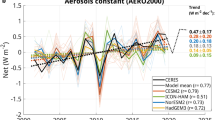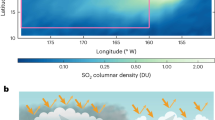Abstract
There has been considerable interest recently in changes in the composition of the stratosphere following the suggestion by Molina and Rowland1 that certain fluorocarbons could ultimately lead to ozone destruction. This interest has increased since the discovery in 1985 of large ozone decreases over Antarctica2. It is now known that many species have the potential to modify the stratospheric ozone distribution either directly, by photochemical processes, or indirectly, through changes in atmospheric temperature by modification of the transmission of infrared radiation. Here we present calculations using a two-dimensional atmospheric model of the effect on stratospheric ozone of increases in the atmospheric abundances of CO2 and various chlorine-containing compounds. We have carried out such calculations previously3 but changes in the kinetic data used in the model have led to very significant differences in the calculated ozone modification. In particular, the lower stratosphere, a difficult region to model, now plays an even more crucial role in the vertically integrated ozone depletion. We believe that uncertainties in the thermal response of the lower stratosphere represent a significant limitation in our ability to predict future states of the middle atmosphere.
This is a preview of subscription content, access via your institution
Access options
Subscribe to this journal
Receive 51 print issues and online access
$199.00 per year
only $3.90 per issue
Buy this article
- Purchase on Springer Link
- Instant access to full article PDF
Prices may be subject to local taxes which are calculated during checkout
Similar content being viewed by others
References
Molina, M. J. & Rowland, F. S. Nature 249, 810–812 (1974).
Farman, J. C., Gardiner, B. G. & Shanklin, J. D. Nature 315, 207–210 (1985).
Haigh, J. D. & Pyle, J. A. Q. Jl R. met. Soc. 108, 551–574 (1982).
Curtis, A. R. Proc. R. Soc. A236, 156–159 (1956).
Williams, A. P. thesis, Univ. Oxford (1971).
Houghton, J. T. The Physics of Atmospheres 63 (Cambridge University Press, 1977).
NASA/ WMO Atmospheric Ozone 1985 (World Met. Org., Geneva, 1986).
Fels, S. B., Mahlman, J. D., Schwarzkopf, M. D. & Sinclair, R. W. J. atmos. Sci. 37, 2265–2297 (1980).
Manabe, S. & Wetherald, R. T. J. atmos. Sci. 37, 99–118 (1980).
Harwood, R. S. & Pyle, J. A. Q. Jl R. met. Soc. 101, 723–748 (1975).
Pyle, J. A. Pure appl. Geophys. 118, 355–377 (1980).
Haigh, J. D. & Pyle, J. A. Nature 279, 222–224 (1979).
JPL/ NASA Chemical Kinetics and Photochemical Data for Use in Stratospheric Modelling, Evaluation No. 7 Jet Propul. Lab. Publ. 85–37 (Jet Propulsion Laboratory, Pasadena, California, 1985).
Haigh, J. D. Q. Jl R. met. Soc. 110, 167–185 (1984).
Author information
Authors and Affiliations
Rights and permissions
About this article
Cite this article
Eckman, R., Haigh, J. & Pyle, J. An important uncertainty in coupled chlorine–carbon dioxide studies of atmospheric ozone modification. Nature 329, 616–619 (1987). https://doi.org/10.1038/329616a0
Received:
Accepted:
Issue Date:
DOI: https://doi.org/10.1038/329616a0
Comments
By submitting a comment you agree to abide by our Terms and Community Guidelines. If you find something abusive or that does not comply with our terms or guidelines please flag it as inappropriate.



